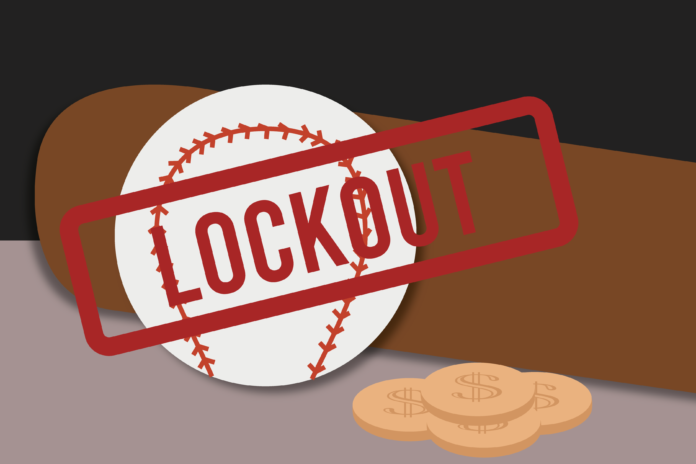Why Major League Baseball was almost canceled this year
By ALEX MOTAWI — almotawi@ucdavis.edu
Baseball is America’s sport. The country has been running the bases since 1846 and has spread the sport all across the world. It has been integrated into many cultures, which have created their own rich baseball histories. The pinnacle of baseball achievement in the U.S. is winning the World Series by being the best team in Major League Baseball (MLB), the primary league in the U.S. since 1876. Old-time baseball stars like Babe Ruth and Ted Williams are some of the most famous people in the U.S. Let’s be honest — lots of people today (including me) know more about them than even presidents from the same period. In my eyes, one of the only things as deeply ingrained into American culture as baseball and the MLB is capitalism. This winter, when those two societal mainstays collided in the form of the lockout, who won?
Some quick context to get us rolling: The players and their union make what’s called a Collective Bargaining Agreement (CBA) with the MLB (team owners and commissioner). The CBA is essentially the league’s constitution; it covers the rules of the game, both on and off the diamond. But unlike a governmental constitution, it expires every few years and has to be renegotiated, which happened last winter. Since 1993, every time the CBA has reached the verge of expiring, the parties have reorganized the pact to accommodate the changing times. But this year, the two parties were so strongly divided that the owners and the players couldn’t reach a labor agreement, so the players effectively were put on strike almost all winter, and the MLB “locked them out” of playing games.
The disagreements between the two parties came down almost entirely to compensation (i.e. capitalism). The MLB has been extremely profitable, with a majority of the profit going straight into the coffers of team owners instead of the players. Player salaries have been going down for the last few years even as league profits have increased, and the lockout began because players were negotiating for better compensation. During the lockout, most of the communication and bargaining between the groups was about trying to raise the salary for the players, specifically the younger players on rookie contracts.
The lockout played out like the Cold War. The sides couldn’t come to an agreement with threats constantly looming, even though both sides would lose if they couldn’t reach an accord. Thankfully, they did reach an agreement and were able to avoid more cancellations, but who won? And who caved?
As a current fan and someone who loves to cheer for unions taking what they deserve from greedy employers, I think the players got scammed. I believe the MLB was in a position of power from the start, as the billionaire owners could afford to skip games while the players (with a previous minimum salary of $570,500 a year which was changed to $700,000 as part of the agreement) can’t afford to spend the prime of their careers without getting paid.
Let’s look at the final voting totals. The MLB presented the final deal to the union first, and once the players agreed to it, the owners ratified it unanimously with a vote of 30-0. On the union side, it was accepted with a 26-4 vote by the players and a 0-8 vote by the executive subcommittee responsible for the union’s side of the negotiation. The players caved in and wanted to play, even though the people they paid to advise them all voted against the proposition.
Can I blame them? No. It’s their money, not mine, and they did get better treatment than they were receiving previously. Could they have gotten closer to the amount they deserved if they held out longer? Probably.
I’m super excited to watch baseball this season, but the lockout and monetary dispute that almost ruined the season are going to be in the back of my mind — as well as some regret that the billionaire owners have won yet again.
Written by: Alex Motawi — almotawi@ucdavis.edu
Disclaimer: The views and opinions expressed by individual columnists belong to the columnists alone and do not necessarily indicate the views and opinions held by The California Aggie.




